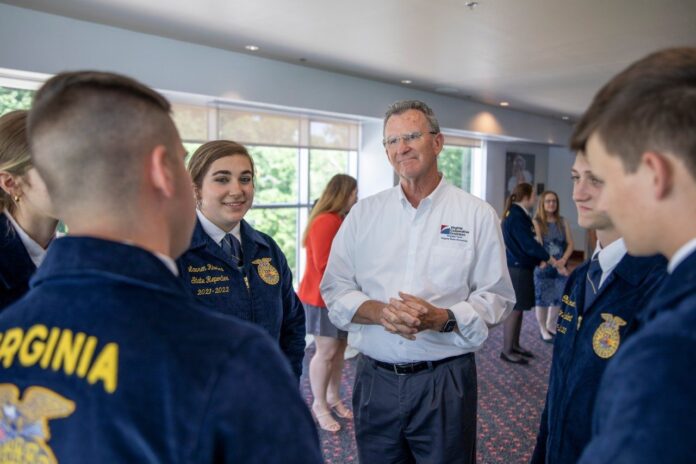Ed Jones was sure that he’d be a researcher after he finished his Ph.D. in wildlife biology at Virginia Tech. He was studying tularemia, an infectious disease that can spread from rabbits to humans, and he thought he’d spend his scientific career bouncing between the mountains and a laboratory.
But one day, he was asked to write a publication on tularemia for Virginia Cooperative Extension, which provided science-based information for people across the state on the challenges of the disease and how they could mitigate it.
That led to a meeting with land managers, where people’s eagerness to learn and collaborate to solve problems struck Jones. In graduate school, Jones helped out a summer camp Extension put on with the Virginia Wildlife Federation, and he assisted 4-H Congress. Something about the connections, and the partnerships and the realness of directly working with communities took hold.
“There was a lot of collaboration between people, which opened up doors to programs I couldn’t do before,” said Jones, whose towering 6-foot-2-inch frame is belied by his quick, disarming laugh. “I began to understand that my calling was to help other people. I could have been a decent teacher, but I really enjoyed the opportunity to be with people and help them.”
And so, for the next 38 years, that is exactly what he did.
As he rose through the ranks of Cooperative Extension in Mississippi, North Carolina, and, finally, Virginia, Jones never lost sight of his mission to help the communities he served by empowering people, stewarding resources, and shaping futures.
“There is a genuineness that comes through, whether he’s talking with someone from the White House or a local constituent,” said Marshall Stewart, the chief engagement officer for the University of Missouri System and the vice chancellor of Extension and engagement at the University of Missouri-Columbia. He has known Jones for decades. “People just believe in Ed Jones. I don’t know anyone who doesn’t feel an affinity for him. He’s just a remarkable leader.”
After 11 years as director of Virginia Cooperative Extension — a tenure among the most impactful in the organization’s more than 100-year history — Jones, 68, is retiring to spend time with his wife, five kids, eight grandkids, and a fleet of canoes that have been out of the water for far too long.
Mike Gutter, currently a professor, specialist, and associate dean of Extension at the University of Florida, was recently named the new director of Virginia Cooperative Extension and will start Nov. 1.
Jones’ is a legacy that not only bolsters Virginia Tech’s reputation, but also helps cement the value and impact Extension has on land-grant institutions and communities across America.
“Ed is leaving a big gap, not just for Virginia, but for the country,” Stewart said

“You get the feeling that it is coming from the heart”
Soon after Jones’ first day as the director of Virginia Cooperative Extension, Alan Grant, dean of the Virginia Tech College of Agriculture and Life Sciences and Jones’ boss, took him to a meeting with some of Extension’s many stakeholders.
During the meeting, a stakeholder began expressing concern about Extension agent vacancies in local offices. Jones had only been on the job for a day, but he dove right in, listening to her concerns and asking her questions about how they could solve the issue together.
“I could tell by the way he listened and engaged with her that we were in good hands,” said Grant. “Ed is a great people person, and when you speak with him, you know that it is coming from the heart.”
Extension is not a simple or small organization. As an integral part of both Virginia Tech and Virginia State University, it acts as a bridge between the universities and local communities by bringing science and research to communities at the ground level and focusing on areas that directly impact Virginians.
Extension operates out of 107 local offices, 11 Agricultural Research and Extension Centers, and six 4-H educational centers across the commonwealth. Its agents, specialists, and volunteers work to assist farmers, empower youth, and guide responsible resource management in communities across the commonwealth to share knowledge, support businesses, and implement research that advances the well-being of all Virginians. It also helps coordinate the efforts of more than 18,000 volunteers who contribute more than 750,000 hours of service every year.
On top of this, Jones stepped into the role during a period when Extension had been changing and needed long-term stable leadership. Positions across the state had been vacant, and relationships with the state legislators and county administrators who help fund Extension needed to be strengthened.
“We needed someone who would have the emotional intelligence to know when to slow down and talk about details and when to speed up and be ready to go,” said Bobby Grisso, who was an associate director of Extension programs when Jones started. “He had a good way of working with legislators and upper administrators in counties to try to understand what the issues are and how we can team up together.”

Over time, Jones not only repaired those relationships, he also helped restore funding to Extension, expanded the number of Extension agents from 179 in 2012 to 240 in 2022, led an organizational effectiveness plan, championed a rebranding of the organization, and refocused the program development approach.
Through it all, Jones did more than just help stabilize the organization — he helped cement Extension’s role and value for years to come, both inside Virginia Tech and around the commonwealth. He helped broaden the reach of Extension beyond traditional agriculture and natural resource issues to focus on the most pressing issues facing a community.
“As an organization, we should not be subject-matter bound, but we should be open to what the community needs are and figure out what resources we can garner to address them,” Jones said.
Today, Extension delivers programs to fight the opioid epidemic, classes to fight obesity, training on how to be financially sound, youth outreach programs teaching STEM, and nutritional education programs in Africa, just to name a few. Jones once told a county administrator that aside from filling potholes, there isn’t anything Extension can’t do to help improve the well-being of local communities. He then backtracked and said maybe he could find some volunteers to help with the potholes.
“Ed has been a visionary leader and invaluable advocate for Virginia Tech’s land-grant mission to address the education, social, economic, and environmental needs of the commonwealth and beyond,” said Tim Sands, president of Virginia Tech and a mentor to Jones. “His service will have a positive impact on Virginians for years to come.”
“Let’s think about it, and let’s talk about it”
Ray McKinnie was an assistant dean at North Carolina A&T in 2004 when he met the new program leader for agriculture and natural resources at North Carolina State University. Extension in every state is a joint partnership between the 1872 land-grant universities and the 1890 historically Black colleges and universities, so McKinnie was eager to meet the new person with whom he’d be working.
Jones’ desire to be a collaborative partner to find real solutions was evident from the get-go.
“Any time we had an idea or an issue to tackle, I remember him saying, ‘Let’s think about it, and let’s talk about it,’” McKinnie said. “He saw value in our partnerships and what we could accomplish together.”
Twelve years later, when McKinnie took the job as the dean of the Virginia State University College of Agriculture and 1890 Extension administrator, Jones, then the director of Virginia Cooperative Extension, was the first one to call and congratulate his colleague across the state.
Jones and McKinnie were tight partners over the years and brought a level of collaboration that stressed the notion that Virginia Cooperative Extension acting as one system could best serve the people of the commonwealth.
“As people began to see that leadership had a level of comfort with each other, it had a trickle-down effect,” McKinnie said. “Virginia is now touted as one of the best working relationships between an 1890 land-grant and an 1862 land-grant university in the country.”

That relationship and desire to collaborate not only helped improve programs, marshal resources, and create more innovative and effective ways to educate the public, but it also helped during difficult times.
In 2020, when the dialogue around race relations was a national issue, Jones, whose son is a white police officer, and McKinnie, who is Black, not only had a series of deeply personal conversations, they opened up the issue to all of Extension and encouraged everyone in the organization to take a hard look at their own biases and to talk with each other about the issues that linger around race relations in America.
One of the forums in which they had that conversation was during their ongoing “Ask Ed and Ray Anything,” sessions, where everyone is encouraged to submit anonymous questions and the two would answer anything. The events are held a few times a year as a way to connect with everyone in a large organization.
Jones never faltered during the sessions, even as hundreds of people tuned in and asked hard questions of their leader about a range of topics on hiring, raises, COVID-19, and more. But they always thanked Jones for his candor.
“To have that willingness to hear what the field has to say, good, bad, or ugly and to open yourself up like that on the spot demonstrates your confidence in your abilities as a leader,” said Lonnie Johnson, who oversees the 107 local Extension offices as associate director for field operations.
“He had the courage to stand up for what is right”
Jones’ impact has reached far beyond the borders of Virginia. Over the last decade, he worked on a national scale to ensure that the entire Cooperative Extension system will continue to make a lasting impact on America for generations to come.
He’s been a member of the Leadership Advisory Council of the Extension Committee on Organization and Policy, a member of the National 4-H Council Board of Trustees, chair of the Extension Committee on Organization and Policy 4-H Leadership Committee, and chair of the Extension Committee on Organization and Policy.
His service was recognized with the Excellence in Leadership Award from the Association of Southern Region Extension Directors in 2020. Last year, he was given the Distinguished Service Ruby Award — the most prestigious level of recognition from Epsilon Sigma Phi, one of the oldest organizations of Extension professionals — for his outstanding leadership, innovative thinking, and sustained exceptional performance across his 37 years in Cooperative Extension.
These national connections often found him working alongside Jennifer Sirangelo, president and CEO of the National 4-H Council, which is the largest youth development organization in the United States. While they worked together on expanding the reach of 4-H and how to make it a pipeline for talent, they also had some sensitive issues to tackle, such as 4-H’s policy on the inclusion of transgender youth.
“Ed is all about inclusion and he had the courage to stand up for what was right,” Sirangelo said. “He was the spokesperson for Extension’s values.”
After one long day of hard work, Sirangelo texted Jones to ask why he put so much effort and passion into his work. He responded with a photo of his grandchildren.
“He said he wanted the world they were growing up in to be a better place,” she said.

Jones, ever wanting to help out and lead, isn’t completely retiring after he leaves Extension. He’s going to work part-time with Sirangelo at 4-H to help put policies in place to help the next generation of America’s youth.
“He is driven by purpose and wants to continue to have that purpose,” Sirangelo said.
For Jones, that purpose was never about accolades and awards, but simply about making a positive change. His unique leadership style that mixed passion and kindness with wisdom and vision benefited not only the group that he led but people across Virginia and the U.S.
“I want to be remembered as someone who cared for the people in our organization who are making a difference for the people of the commonwealth,” he said.
He will be.
– Zeke Barlow

